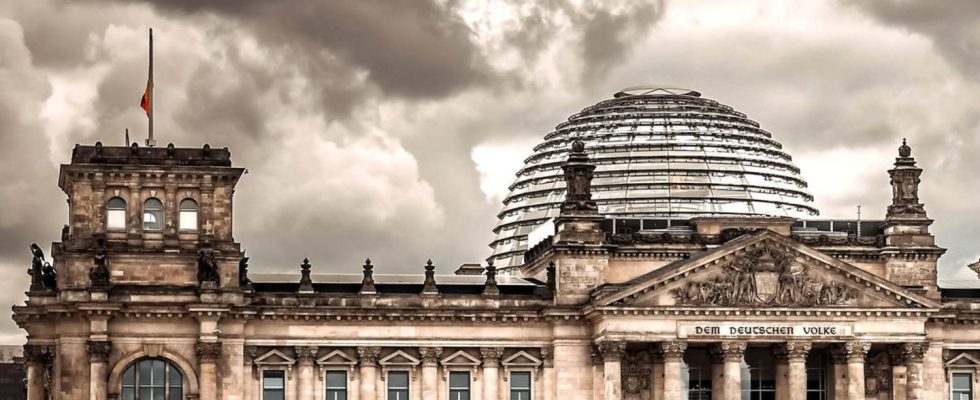On Tuesday, the Federal Constitutional Court will decide whether the federal election in Berlin must be repeated. What is at stake.
It was only a month ago that a ruling by the Federal Constitutional Court plunged the government into a deep crisis: Illegal budget tricks – certified by the highest court – led to billions missing in this and the following years. An emergency compromise, including numerous cost-cutting measures, has just been hammered out with a hot needle, when Berlin politicians are once again turning their attention anxiously to Karlsruhe.
There, the judges will decide on another lawsuit from the opposition on Tuesday: it is about the extent to which the 2021 federal election in Berlin must be re-held – the reason being numerous mishaps on election day. Everyone actually sees that there were problems. More than 1,700 objections were raised against the election, including from the then Federal Returning Officer himself.
That’s why the Bundestag, with its governing majority of the SPD, Greens and FDP, decided: The federal election should be repeated in 431 of Berlin’s 2,257 electoral districts, i.e. around a fifth. But is that enough? No, think the CDU and CSU. The Union faction assumes that the election should be repeated in even more districts and therefore, as with the budget, went to court. If she is right, it would be the second defeat in Karlsruhe for the traffic lights in a very short time. How bad can it get? Answers to the most important questions.
Does the election have to be repeated?
It is at least a theoretical possibility: the Karlsruhe judges could deviate from the Bundestag’s decision and stipulate that the election does not have to be repeated at all. However, experts consider this to be unlikely.
Rather, it will be a question of the extent to which the election will be repeated: Is the scope set by the traffic light factions sufficient or does it need to be re-voted in even more districts? Is it enough to let the second votes (which are used to vote for a party) be re-voted or does the federal election in Berlin have to be completely repeated? The Union faction wants the second votes for the party lists to be cast again in the half of the Berlin constituencies in which the then Federal Returning Officer attacked the election. The first votes for direct candidates should be cast again in two constituencies.
Who will it be particularly critical for?
If Karlsruhe declares all results of the federal election in Berlin invalid, the approximately 2.4 million Berliners would be called to vote again. Because Berlin only represented around four percent of eligible voters across Germany in 2021, even in this case there should be little impact on the majority in the Bundestag.
But Berlin MPs, who only narrowly won their constituency two years ago, could suffer a defeat if it were repeated and would therefore have to leave the Bundestag. Others who failed in 2021 could now still enter parliament.
There could be particularly harsh consequences for the former left-wing faction, which remained below the five percent threshold in 2021 and was only able to enter parliament because it won three direct mandates, two of them in Berlin. If either Gregor Gysi or Gesine Lötzsch lose their direct mandate in the repeat election, all 39 MPs would lose their mandates – including the ten defectors around Sahra Wagenknecht.
Experts disagree about how likely this scenario is. From the perspective of constitutional lawyer Ulrich Battis, professor emeritus at Berlin’s Humboldt University, it is quite possible: “I expect that there will be a repeat of the federal election throughout Berlin,” he told the “Tagesspiegel”. The constitutional lawyer Sophie Schönberger from the University of Düsseldorf, however, contradicts: “In the Berlin election there were apparently errors in the ballot papers that do not apply to the federal election. That could speak against a complete repeat of the federal election in Berlin,” she also said “Tagesspiegel”.
What she means: In 2021, Berliners not only elected a new Bundestag, but also a new House of Representatives. The elections to the House of Representatives were completely repeated on February 12, 2023. With far-reaching consequences: The CDU replaced the SPD as the strongest force in the state and has led the state government ever since.
What is the most likely scenario?
It is most likely that in the end only a portion of Berliners will be asked to go to the ballot box again. How many voting districts it will affect is the crucial question. It is conceivable that the Federal Constitutional Court will reject the Union’s request – then there would be a repeat of what the Bundestag has already decided.
However, the court may also reduce or increase the number of districts in which elections must be held again. At the oral hearing in July, the court did not show where it was leaning, said Berlin state returning officer Stephan Bröchler to “rbb”. “The judges of the Second Senate asked questions in all directions.” So you won’t be able to say for sure until you know the verdict: it will be announced at 10 a.m. on Tuesday.
How is this continuing?
This also depends on what the further processes are. “Only when we know whether we are facing a partial or complete repeat election can a series of elementary decisions be made,” explained state returning officer Bröchler a few days ago. For example, the number of polling stations and election workers and the number of ballot papers required must then be determined. According to Bröchler, there were 60 days left for implementation after the ruling from Karlsruhe. This means February 11, 2024 is the last possible election day.

